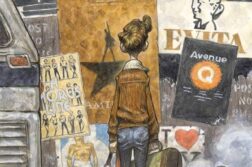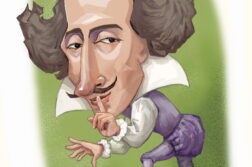The Little Dog Laughed
A play by Douglas Carter Beane
Cort Theatre, New York
EVER SINCE the early days of Hollywood, actors and writers who abandoned “the Theatre” for the movies were thought to have sold their artistic souls to the celluloid devil. Douglas Carter Beane’s The Little Dog Laughed is the latest iteration of this paradigm.
Tuned into the Zeitgeist, Beane cleverly builds the action around an up-and-coming Hollywood hunk named Mitch whose agent Diane,  a tough, wisecracking, lipstick lesbian—wants to buy a hot, homo-themed play by an out New York playwright as a star vehicle for her closeted client, the very same Mitch. But things get messy when her ambitious boychick starts hanging out with a young male hustler, Alex, and—perish the thought!—begins toying with the notion of coming out on his own, or at least allowing his new friend to be seen with him in public. By Diane’s lights, Mitch, who wants to be a Famous Movie Star, mustn’t do this because Mitch will then “not inspire lust in common women and every common man will feel superior to you!” And when Mitch replies, “Maybe I’ll be a famous actor with a ‘friend’?” Diane responds, “Are you British? Are you knighted?”
a tough, wisecracking, lipstick lesbian—wants to buy a hot, homo-themed play by an out New York playwright as a star vehicle for her closeted client, the very same Mitch. But things get messy when her ambitious boychick starts hanging out with a young male hustler, Alex, and—perish the thought!—begins toying with the notion of coming out on his own, or at least allowing his new friend to be seen with him in public. By Diane’s lights, Mitch, who wants to be a Famous Movie Star, mustn’t do this because Mitch will then “not inspire lust in common women and every common man will feel superior to you!” And when Mitch replies, “Maybe I’ll be a famous actor with a ‘friend’?” Diane responds, “Are you British? Are you knighted?”
The Little Dog Laughed had a hugely successful Off Broadway run earlier this year, allowing its move to a larger Broadway house. In the transition, two key cast members were retained: Julie White as Diane, who raucously chews up the modern minimalist scenery; and Johnny Galecki (late of Roseanne) as the sexually ambivalent hustler Alex, who’s given much opportunity to show off his pint-size buffness and prove himself the whore with a heart of gold. Meanwhile, the Hollywood hunk, Mitch, is now embodied by a certified celluloid cutie of considerable physical presence, Tom Everett Scott, who starred in Tom Hanks’ directorial debut, That Thing You Do! (1996), and a variety of movie and TV roles since.
The play is not without problems. Few of the scenes between Mitch and Alex, or between Alex and his sometime girlfriend Ellen, rise to the verbal pyrotechnics or wit that Diane puts on full display, or plumb the emotional depths inherent in the material. We might have expected director Scott Ellis to nail the dramatic elements in equilibrium with Diane’s wickedly droll appeal. Galecki as Alex has impish charm and the tenderness of a little boy lost. I can further attest that his revealing the full monty will not hurt his career. Tom Everett Scott’s appearance is solidly appealing, if not deeply indelible. And Ari Graynor as Ellen, a forlorn Holly Golightly, valiantly tries to give her character Gen Y ennui with lines like, “We’re 24. Hope is dead.”
But none of them measures up to Julie White. Whenever she’s center stage, spouting cynical wisdom and world-weary dicta, we feel ourselves in the hands of a master thespian. Ms. White has honed her delivery to a fine edge—she can hiss, purr, and rant, all within the space of five seconds—and she uses her long limbs and toned torso to project the body language of a viper ready to pounce. In fact, the game is rigged in her favor. The Devil is a woman and gets all the best lines. Speaking directly to us from the proscenium, Ms. White plays the Mephistophelean representative of all our basest instincts. At one point she reports from L.A. by phone to the invisible out New York playwright: “They are excited about your play being a movie. There is a lot of excitement, and if not, there is a lot of resentment, which is even better.”
In this age of E! Entertainment News and celebrity culture, where we eat up gossip like so many energy bars, we are all pimping for the stars. Every potential outing of another “Sexiest Man Alive” has us salivating over each new clue gleaned from the smallest detail of the star’s misspent youth. We all want chapter and verse about the Faustian bargains the stars make on their way to the top. And if we can’t get the facts, we can always blog them.
Beane certainly has some serious things on his mind in Little Dog, not least the hypocrisy of the entertainment industry, the trumping of love and friendship by personal ambition, the fluidity of sexual identity, and the collaboration of image-conscious homosexuals in their own media-driven defamation. In Diane’s frequent address to the audience—and Julie White certainly knows how to play to the rafters and keep the laughs coming—we are constantly reminded that we live in an age of venality and (with a nod to Mr. Tennessee Williams) mendacity. One can’t help being reminded of what Orson Welles said of the 1950’s blacklist in Hollywood: “Friend informed on friend not to save their lives but to save their pools.” More than five decades later, some queers in L.A. sell their souls to save their perks.
Allen Ellenzweig, a frequent contributor to this journal, is the author of The Homoerotic Photograph.




